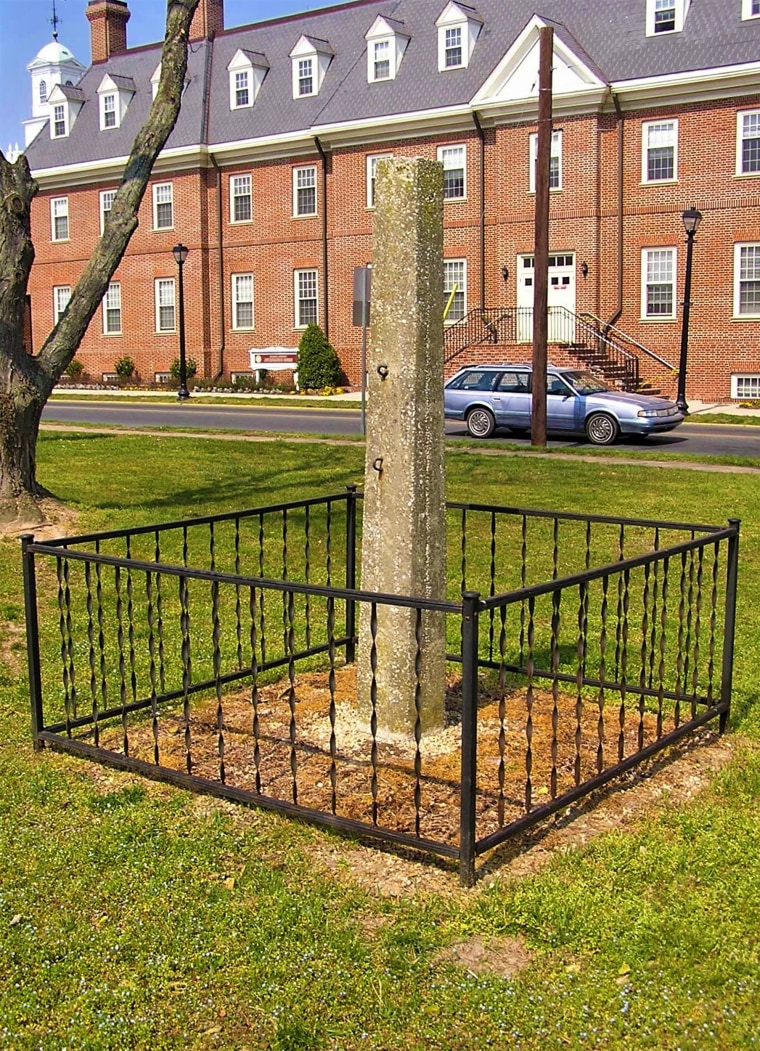A whipping post at a public plaza in Delaware was removed to fanfare on Wednesday after historians and activists decried its presence as a reminder of systemic racism and injustice.
A crowd gathered around the post, which has stood near the Old Sussex County Courthouse at the public circle in Georgetown, Delaware, since 1993. Two backhoes worked to pluck it from the grounds as people cheered.
"This is kind of reminiscent for me of a time back in 1938 when I actually saw a man getting whipped at the whipping post in Dover," 94-year-old Reba Hollingsworth, vice-chair of the Delaware Heritage Commission, said in a video from the event.

In 1972, Delaware became the last state to abolish using whipping posts as a state punishment. The Georgetown post was used until 1952, according to the Delaware Division of Historical and Cultural Affairs.
It was established sometime after 1931 at the Sussex Correctional Institution south of Georgetown and moved to the old courthouse in 1993.
"Each time I come to Georgetown and see this replica here I remember," Hollingsworth said. "It’s time for us to put these kinds of things in museums."
The post's removal is part of a nationwide reassessment of monuments that represent racism and oppression, fueled by the May death of George Floyd while in police custody and the subsequent protests calling for an end to systemic injustice. The Delaware Division of Historical and Cultural Affairs said it was responding to community calls for the post's removal.
According to a 1947 history text, "Red Hannah: Delaware's Whipping Post," a majority of those punished at the Georgetown post were Black people. The book by Robert Graham Caldwell called the punishment "barbaric" and sought to prove, by the preponderance of recidivism, it was ineffective.
The most common category of crime punished at the post was petty theft, according to the book.
The Division of Historical and Cultural Affairs plans to put it in storage, where it will share space with a whipping post from Dover. It could be slated for a museum setting in the future, the division said in a statement.
“It is appropriate for an item like this to be preserved in the state’s collections, so that future generations may view it and attempt to understand the full context of its historical significance,” the division's director, Tim Slavin, said in the statement.
“It’s quite another thing to allow a whipping post to remain in place along a busy public street — a cold, deadpan display that does not adequately account for the traumatic legacy it represents, and that still reverberates among communities of color in our state.”
Georgetown leaders are also under pressure to remove a monument dedicated to Confederate soldiers from Delaware that was erected in the city in 2007. A Change.org petition urging the Georgetown Historical Society to remove the monument and its Confederate flag has over 3,000 signatures.
The monument cost the historical society over $14,000 in funding last year after state legislators didn't want to be seen supporting organizations that "celebrate the Confederacy and the traitors who fought for its failed racist ideology of hate and enslavement," reported Delaware Online.
